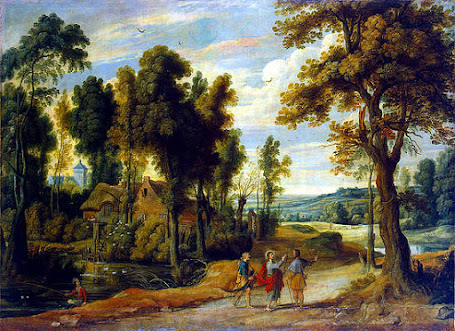We think we remember.
But what we have is assemblage of intimations of fluctuations of mental constructs that seep into physical images and feelings remembered by swirling atoms formed into corporeal neural firings projecting images on historical screen like morning wavering of sunlight and shadow through net yet blossomed tree.
What we remember is the remembering, not the thing itself.
No one has ever seen God.
But we remember something about the passing gaze.
Unlike a painting, our minds are not fixed. It is like the image is wiped clean and a new one is created every moment. While the next image will often be very similar to the previous one, it is never exactly the same. It is constantly changing in subtle ways leading to an endless stream of karmic appearances. . . . Think of the places that appeared to you in childhood and the places that appear to you now. Think of the people you have met and the emotions or thoughts you have had. If we compare all these experiences, we can begin to get a sense of how powerful and creative our karma can be.
From The Realm of Shambhala: A Complete Vision for Humanity’s Perfection by Shar Khentrul Jamphel Lodrö (Khentrul Rinpoche) © 2021,Tricycle
This is how I remember my karma.
Show mercy upon me, oh God, according to your kindness, and according to the multitude of your mercies, blot out my sins.
Psalm 51:1, Aramaic Bible in Plain English
Images engraved on my retina blind me to what is passing before me.
Karmic newsreels of black and white grainy moving pictures watched from darkened isolation theater of saturday film remastery — with popcorn and bubblegum on soles of sneakers.
From inner recollection the realization — we are always there; we were never there.
And the words:
And no longer shall each one teach his neighbor and each his brother, saying, ‘Know the Lord,’ for they shall all know me, from the least of them to the greatest, declares the Lord. For I will forgive their iniquity, and I will remember their sin no more.”
Jeremiah 31:34 ESV
Remember separation no more.
We are not condemned to live in what has been forgotten.
We are invited to dwell in what is being created, mind you, right here.
I look over to zazen bench. There is a gray beret on its seat, the kneeling pads inviting, promising to hold up whatever weight placed on them.
It is Easter Saturday.
Cat assesses through screen window the outdoors.
Who was it said: Absence doesn’t make the heart grow fonder; absence let’s the heart forget”?
Then there’s the poet:
“...whoever you are, no matter how lonely, the world offers itself to your imagination, calls to you like the wild geese, harsh & exciting - over & over announcing your place in the family of things.”
The whole of the book of genesis, indeed, the whole of the stories of our historical and cultural experience can be seen as a surrounding of two words, maybe the only two words we’ve ever received from what we call God.
And those two words?
Imagine this!


